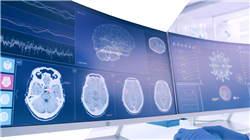University certificate
The world's largest artificial intelligence faculty”
Description
With this 100% online Postgraduate certificate, you will master the Ethical and Legal Aspects related to the implementation of Artificial Intelligence in Diagnostic Imaging”

As Artificial Intelligence becomes an essential tool in Diagnostic Imaging, ethical and legal issues arise that need to be addressed. In fact, the World Health Organization has pointed out the need to implement a robust ethical framework to guide the use of these technologies, which must be aligned with the rights and dignity of patients. In this context, specialists need to have a comprehensive knowledge of the ethical and legal factors involved in the use of this tool in the clinical setting.
In this scenario, TECH creates an exclusive Postgraduate certificate in Ethical and Legal Aspects of Artificial Intelligence in Diagnostic Imaging. Designed by references in this field, the academic itinerary will delve into the legal and regulatory considerations in Artificial Intelligence applied to medical imaging with Compliance.ai. Along the same lines, the syllabus will delve into factors ranging from informed consent or transparency in the use of clinical data to respect for patient autonomy in decisions based on Artificial Intelligence. Thanks to this, graduates will develop advanced skills with which they will evaluate ethical situations related to the use of this tool in medical practice, while at the same time applying the relevant legal regulations in this field to guarantee both data protection and compliance with the law.
Moreover, in terms of methodology, the program is taught 100% online, giving physicians the opportunity to access the content from anywhere and at any time, adapting the study to their schedules. In addition, TECH employs its revolutionary learning method: Relearning. This system consists of the repetition of key concepts to fix knowledge and facilitate lasting learning. In addition, the only thing that graduates will need is an electronic device with an Internet connection to access the Virtual Campus.
Position yourself in the job market with a 100% online program that adapts to your needs and allows you to update your knowledge in an immersive way”
This Postgraduate certificate in Ethical and Legal Aspects of Artificial Intelligence in Diagnostic Imaging contains the most complete and up-to-date program on the market. The most important features include:
- Development of practical cases presented by experts in Artificial Intelligence
- The graphic, schematic and eminently practical contents with which it is conceived gather scientific and practical information on those disciplines that are indispensable for professional practice
- Practical exercises where self-assessment can be used to improve learning
- Its special emphasis on innovative methodologies
- Theoretical lessons, questions to the expert, debate forums on controversial topics, and individual reflection assignments
- Content that is accessible from any fixed or portable device with an Internet connection
Do you want to develop critical thinking skills to evaluate the impact of Artificial Intelligence in clinical decision making? Achieve it with this university program”
The program’s teaching staff includes professionals from the field who contribute their work experience to this educational program, as well as renowned specialists from leading societies and prestigious universities.
The multimedia content, developed with the latest educational technology, will provide the professional with situated and contextual learning, i.e., a simulated environment that will provide immersive education programmed to learn in real situations.
This program is designed around Problem-Based Learning, whereby the professional must try to solve the different professional practice situations that arise during the course. For this purpose, students will be assisted by an innovative interactive video system created by renowned and experienced experts.
You will delve into the regulations on the transparency of Artificial Intelligence algorithms in the healthcare field"

TECH's online methodology will allow you to choose the time and place to study, without hindering your professional work"
Syllabus
This university program is designed by experts in Ethical and Legal Aspects of Artificial Intelligence in Diagnostic Imaging. The study plan will delve into issues such as the management of algorithmic biases or compliance with data protection regulations to informed consent. Along the same lines, the syllabus will provide graduates with the most sophisticated strategies to ensure data confidentiality in Artificial Intelligence projects. In addition, the didactic materials will analyze advanced techniques to improve the explainability of Artificial Intelligence models.

You will implement technologies that ensure the privacy and security of patient data”
Module 1. Ethical and Legal Aspects of Artificial Intelligence in Diagnostic Imaging
1.1. Ethics in the Application of Artificial Intelligence in Diagnostic Imaging with Ethics and Algorithms Toolkit
1.1.1. Fundamental Ethical Principles in the Use of Artificial Intelligence for Diagnosis
1.1.2. Algorithmic Bias Management and its Impact on Diagnostic Fairness
1.1.3. Informed Consent in the Era of Diagnostic Artificial Intelligence
1.1.4. Ethical Challenges in the International Implementation of Artificial Intelligence Technologies
1.2. Legal and Regulatory Considerations in Artificial Intelligence Applied to Medical Imaging with Compliance.ai
1.2.1. Current Regulatory Framework for Artificial Intelligence in Diagnostic Imaging
1.2.2. Compliance with Privacy and Data Protection Regulations
1.2.3. Validation and Certification Requirements for Artificial Intelligence Algorithms in Healthcare
1.2.4. Legal Liability in Case of Diagnostic Errors due to Artificial Intelligence
1.3. Informed Consent and Ethical Aspects in the Use of Clinical Data
1.3.1. Review of Informed Consent Processes Adapted to Artificial Intelligence
1.3.2. Patient Education on the Use of Artificial Intelligence in their Medical Care
1.3.3. Transparency in the Use of Clinical Data for Artificial Intelligence Training
1.3.4. Respect for Patient Autonomy in Decisions Based on Artificial Intelligence
1.4. Artificial Intelligence and Accountability in Clinical Research
1.4.1. Assignment of Responsibilities in the Use of Artificial Intelligence for Diagnosis
1.4.2. Implications of Artificial Intelligence Errors in Clinical Practice
1.4.3. Insurance and Coverage for Risks Associated with the Use of Artificial Intelligence
1.4.4. Strategies for the Management of Incidents Related to Artificial Intelligence
1.5. Impact of Artificial Intelligence on Equity and Access to Health Care with AI for Good
1.5.1. Assessment of the Impact of Artificial Intelligence on the Distribution of Medical Services
1.5.2. Strategies to Ensure Equitable Access to AI Artificial Intelligence Technology
1.5.3. Artificial Intelligence as a Tool to Reduce Health Disparities
1.5.4. Case Studies on the Implementation of Artificial Intelligence in Resource-Limited Settings
1.6. Privacy and Data Protection in Research Projects using Duality SecurePlus
1.6.1. Strategies for Ensuring Data Confidentiality in Artificial Intelligence Projects
1.6.2. Advanced Techniques for Patient Data Anonymization
1.6.3. Legal and Ethical Challenges in the Protection of Personal Data
1.6.4. Impact of security breaches on public trust and confidence
1.7. Artificial Intelligence and Sustainability in Biomedical Research with Green Algorithm
1.7.1. Use of Artificial Intelligence to Improve Efficiency and Sustainability in Research
1.7.2. Life Cycle Assessment of Artificial Intelligence Technologies in Healthcare
1.7.3. Environmental Impact of Artificial Intelligence Technology Infrastructure
1.7.4. Sustainable Practices in the Development and Deployment of Artificial Intelligence
1.8. Auditing and Explainability of Artificial Intelligence Models in the Clinical Setting with IBM AI Fairness 360
1.8.1. Importance of Regular Auditing of AI Algorithms
1.8.2. Techniques to Improve the Explainability of AI Models
1.8.3. Challenges in Communicating AI-Based Decisions to Patients and Physicians
1.8.4. Regulations on the Transparency of Artificial Intelligence Algorithms in Healthcare
1.9. Innovation and Entrepreneurship in the Field of Clinical Artificial Intelligence with Hindsait
1.9.1. Opportunities for Startups in Artificial Intelligence Technologies for Healthcare
1.9.2. Collaboration Between the Public and Private Sectors in the Development of Artificial Intelligence
1.9.3. Challenges for Entrepreneurs in the Healthcare Regulatory Environment
1.9.4. Success Stories and Lessons Learned in Clinical Artificial Intelligence Entrepreneurship
1.10. Ethical Considerations in International Clinical Research Collaboration with Global Alliance for Genomics and Health with GA4GH
1.10.1. Ethical Coordination in International AI Projects
1.10.2. Managing Cultural and Regulatory Differences in International Collaborations
1.10.3. Strategies for Equitable Inclusion in Global Studies
1.10.4. Challenges and Solutions in Data Sharing

You will have a library of teaching resources available 24 hours a day and with teaching materials that stand out for their quality. Enroll now!”
Postgraduate Certificate in Ethical and Legal Aspects of Artificial Intelligence in Diagnostic Imaging
The integration of artificial intelligence (AI) into diagnostic imaging has radically transformed the way medical images are interpreted and analyzed. This technology not only improves accuracy and efficiency, but also raises important ethical and legal issues that must be addressed by professionals in the field. In this context, TECH Global University offers a very complete Postgraduate Certificate that will specialize you in the fundamental aspects related to the use of AI in medical diagnosis. This program, taught in 100% online mode, will not only allow you to master the technological tools, but will also encourage you to manage ethical responsibility and the regulations governing their application in clinical practice. Topics to be covered include understanding machine learning algorithms, critically analyzing their implementation in different clinical contexts and assessing their impact on the quality of patient care.
Get your degree with a Postgraduate Certificate in Ethical and Legal Aspects of Artificial Intelligence in Diagnostic Imaging
Backed by TECH, this program represents an invaluable opportunity to make a difference at the intersection of technology, ethics and medical practice. The online methodology allows you to manage your study time flexibly, without compromising the quality of teaching. Moving forward, you will learn about future trends in the use of AI in diagnostic imaging and data protection and privacy, ensuring that the use of AI complies with current legal regulations. In addition, you will delve into informed consent in the context of AI, ensuring that you are able to effectively communicate to patients how their information will be used. All of this will prepare you to become a specialized leader in this evolving field - enroll now!







